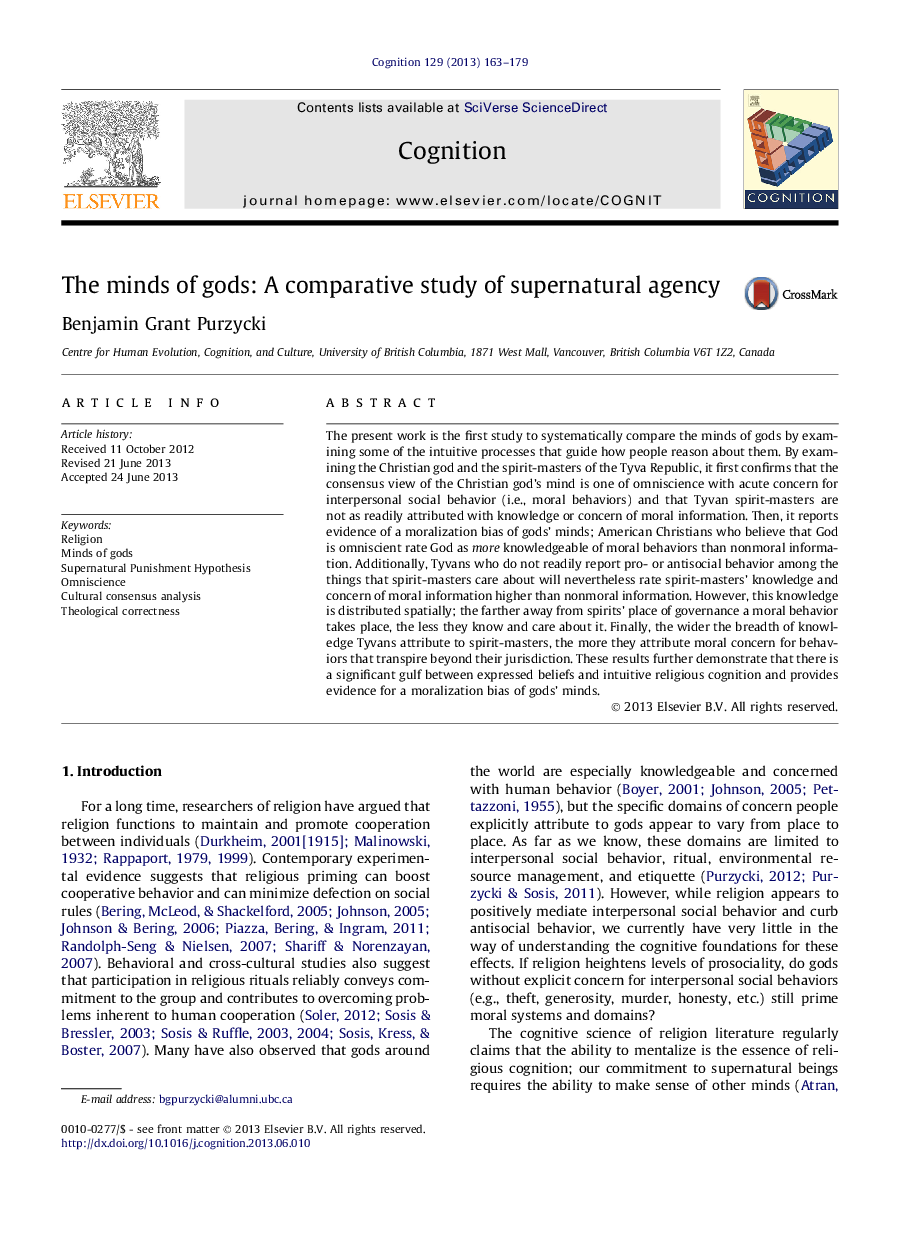| کد مقاله | کد نشریه | سال انتشار | مقاله انگلیسی | نسخه تمام متن |
|---|---|---|---|---|
| 10457697 | 921863 | 2013 | 17 صفحه PDF | دانلود رایگان |
عنوان انگلیسی مقاله ISI
The minds of gods: A comparative study of supernatural agency
ترجمه فارسی عنوان
ذهن خدایان: مطالعه تطبیقی آژانس فراطبیعی
دانلود مقاله + سفارش ترجمه
دانلود مقاله ISI انگلیسی
رایگان برای ایرانیان
کلمات کلیدی
دین، ذهن خدایان، فرضیه عذاب فوقالعاده، همه چیز تجزیه و تحلیل اجماع فرهنگی، صحت الهیات،
ترجمه چکیده
این مقاله اولین مطالعه است که به طور سیستماتیک ذهن های خدایان را با بررسی برخی از فرآیندهای بصری که به مردم چگونه در مورد آنها اشاره می کند، مقایسه می کند. با در نظر گرفتن خدای مسیحی و صاحب روحیه ای از جمهوری تیوا، ابتدا تصدیق می کند که دیدگاه اجماع ذهن خدای مسیح یکی از علم همه جانبه با نگرانی شدید رفتار اجتماعی بین فردی (یعنی رفتارهای اخلاقی) است و روحانیان تیوان به آسانی با دانش یا نگرانی از اطلاعات اخلاقی ارتباطی ندارد. سپس، شواهدی از تعصب اخلاقیات ذهن خدایان را گزارش می کند؛ مسیحیان آمریکایی که معتقدند که خدا شناخت همه جانبه خدا است و بیشتر از رفتارهای اخلاقی آگاهانه نسبت به اطلاعات غیرواقعی است. علاوه بر این، تیوانهایی که به راحتی رفتارهای ضد اجتماعی یا اخلاقی را در میان چیزهایی که مراقب استاد روحانی هستند، گزارش نمیشوند، با این وجود، دانش و روحیه دانشآموزان روحانی و نگرانی از اطلاعات اخلاقی بالاتر از اطلاعات غیرمورال است. با این حال، این دانش فضایی توزیع می شود؛ دورتر از محل حاکمیت روح، رفتار اخلاقی رخ می دهد، کمتر آنها را می شناسند و در مورد آن اهمیت می دهند. در نهایت، گستردگی وسیع دانش، تیلان به روحیه کارشناسی ارشد، بیشتر آن را نگرانی های اخلاقی مربوط به رفتارهایی می کند که فراتر از قلمرو آنهاست. این نتایج بیشتر نشان می دهد که بین باورهای بیان شده و شناخت شهودی شهودی وجود دارد و شواهدی برای تعصب اخلاقیات ذهن خدایان وجود دارد.
موضوعات مرتبط
علوم زیستی و بیوفناوری
علم عصب شناسی
علوم اعصاب شناختی
چکیده انگلیسی
The present work is the first study to systematically compare the minds of gods by examining some of the intuitive processes that guide how people reason about them. By examining the Christian god and the spirit-masters of the Tyva Republic, it first confirms that the consensus view of the Christian god's mind is one of omniscience with acute concern for interpersonal social behavior (i.e., moral behaviors) and that Tyvan spirit-masters are not as readily attributed with knowledge or concern of moral information. Then, it reports evidence of a moralization bias of gods' minds; American Christians who believe that God is omniscient rate God as more knowledgeable of moral behaviors than nonmoral information. Additionally, Tyvans who do not readily report pro- or antisocial behavior among the things that spirit-masters care about will nevertheless rate spirit-masters' knowledge and concern of moral information higher than nonmoral information. However, this knowledge is distributed spatially; the farther away from spirits' place of governance a moral behavior takes place, the less they know and care about it. Finally, the wider the breadth of knowledge Tyvans attribute to spirit-masters, the more they attribute moral concern for behaviors that transpire beyond their jurisdiction. These results further demonstrate that there is a significant gulf between expressed beliefs and intuitive religious cognition and provides evidence for a moralization bias of gods' minds.
ناشر
Database: Elsevier - ScienceDirect (ساینس دایرکت)
Journal: Cognition - Volume 129, Issue 1, October 2013, Pages 163-179
Journal: Cognition - Volume 129, Issue 1, October 2013, Pages 163-179
نویسندگان
Benjamin Grant Purzycki,
